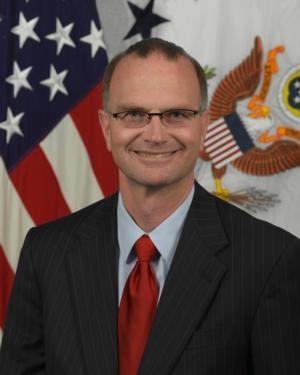Fri, Jun 08, 2012
U.S. Has 'Fine-Tuned' Methods To Promote Responsible Use Of Space
The U.S. has fine-tuned its methods to promote responsible use of space and strengthen international partnerships, Ambassador Gregory L. Schulte, the deputy assistant secretary of defense for space policy, said during the 2012 Women in Aerospace Conference June 1. In his keynote address at the conference, Schulte outlined the plan to protect U.S. advantages and sustainability in space as directed by the National Security Strategy for Space issued by Defense Secretary Leon E. Panetta and national intelligence officials.

"Space is no longer a pristine environment," Schulte (pictured) said. "We have to think differently about how we cooperate with others in space."
Schulte explained that burgeoning interest in space by a number of nations is both an asset and a liability. "Allied capabilities can augment ours, add resilience and increase our ability to operate in a contested space environment when adversaries may be trying to take away our space capabilities," he said. "As there are more and more actors in space, it becomes more important that we bring a certain amount of order to that domain, that we encourage countries to act responsibly." As such, Schulte said, Secretary of State Hillary Rodham Clinton and U.S. Strategic Command, based at Offutt Air Force Base, Neb., have weighed in this year to take deliberate steps in negotiating space situational awareness agreements with countries across the globe.
The discussions have united the "European Union and other space-faring countries to develop an international voluntary code of conduct meant to encourage countries to act responsibly and call out those who act irresponsibly," Schulte said.
The norms, Schulte asserts, aim to help U.S. and coalition countries share information on an emergency basis, encourage best practices to buffer the uptick of mishaps and control the creation of additional debris in space. "(STRATCOM) tracks over 20,000 pieces of debris -- and that's just what they can see," Schulte said. "NASA estimates there are probably hundreds of thousands of pieces of debris up there."
Harnessing international partnerships also includes a plan to expand the Joint Space Operations Center at Vandenberg Air Force Base, Calif., into a coalition asset by integrating Canada's first operational military space-based telescope system, Sapphire. A larger constellation of satellites supplied by international partner nations provides greater coverage and bandwidth, Schulte said, and also creates an international space alliance that can act as a deterrent to threats against the U.S. and its allies.
More News
Also: AFE25 Tickets!, Jamaica Recovery, E-Aircraft at Boeing Fld, Diamond DA50 RG Cert Elon Musk is once again promising the impossible…this time, in the form of a Tesla tha>[...]
Also: Louisville UPS Crash Aftermath, Taiwan Boosts Pilot Pool, Spartan Acquires, DON’T MISS the MOSAIC Town Hall! This three-day Affordable Flying Expo brings together indoo>[...]
“Our strategic partnership with AutoFlight, backed by their substantial technological expertise and tangible advancements in eVTOL airworthiness, represents a significant mil>[...]
Aero Linx: British Gliding Association (BGA) The British Gliding Association is the governing body for the sport of gliding in the UK and members are the 76 clubs that provide glid>[...]
While Descending Toward ASN, He Advanced The Throttle, But The Engine Did Not Respond On October 2, 2025, at 1126 central daylight time, a Cirrus SR22, N812SE, was substantially da>[...]
 Airborne 11.05.25: Tesla Flying Car?, Jepp/ForeFlight Sold, A220 Troubles
Airborne 11.05.25: Tesla Flying Car?, Jepp/ForeFlight Sold, A220 Troubles Airborne 11.07.25: Affordable Expo Starts!, Duffy Worries, Isaacman!
Airborne 11.07.25: Affordable Expo Starts!, Duffy Worries, Isaacman! Aero-News: Quote of the Day (11.05.25)
Aero-News: Quote of the Day (11.05.25) ANN's Daily Aero-Linx (11.05.25)
ANN's Daily Aero-Linx (11.05.25) NTSB Prelim: Cirrus Design Corp SR22
NTSB Prelim: Cirrus Design Corp SR22



